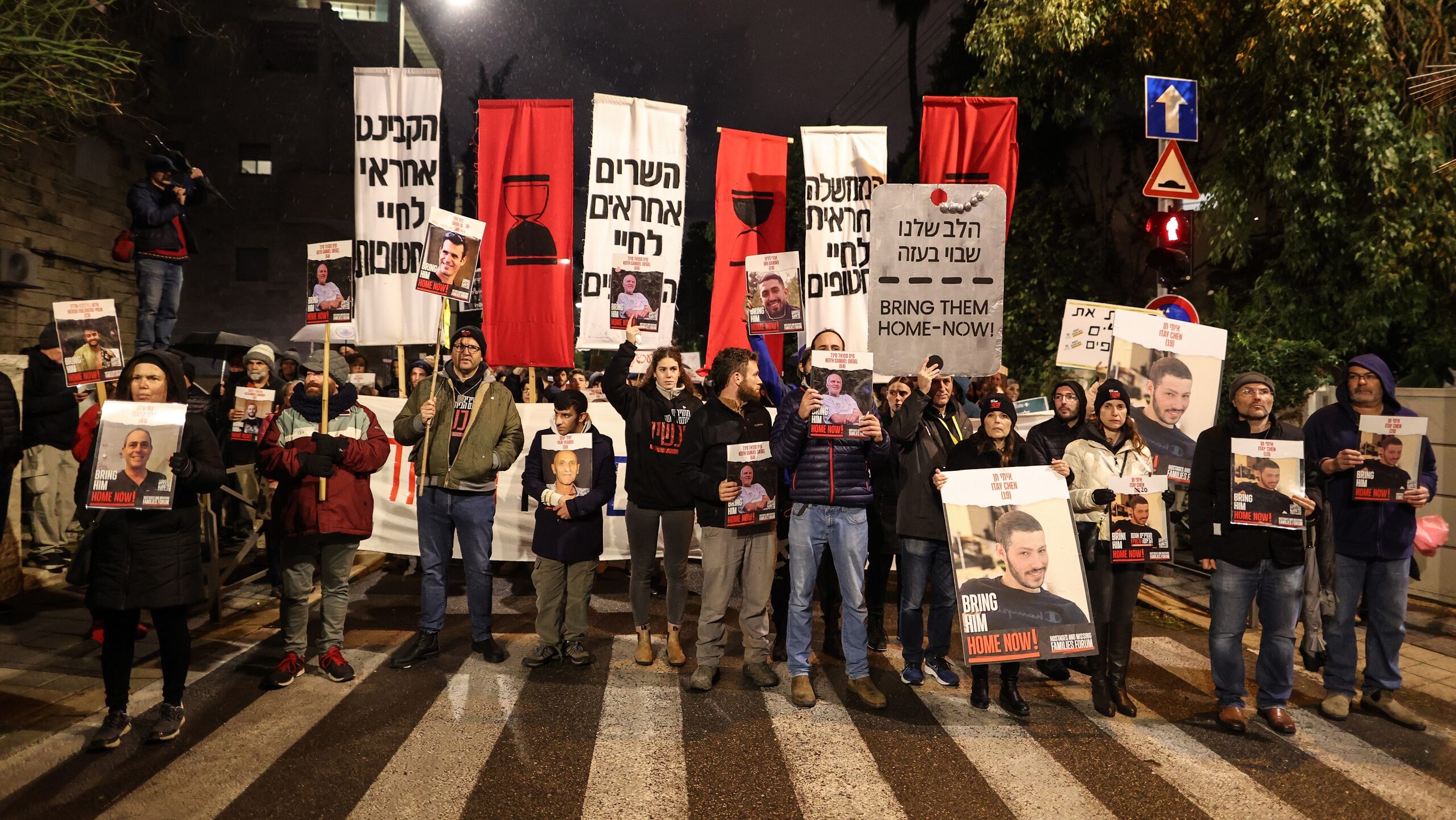Political Unrest Swells in Israel as Netanyahu Dismisses Election Calls
Israeli Prime Minister Benjamin Netanyahu reaffirms the 2026 election schedule, disregarding escalating demands for an early vote amid the conflict
Israeli Prime Minister Benjamin Netanyahu dismissed on Saturday night public calls for early elections, saying the original date set for October 2026 is still in place. Netanyahu has maintained this position since the beginning of the war, insisting wartime is not the time for politics. Despite Netanyahu’s best efforts, consensus around the issue has begun to crack.
Netanyahu made the statement at a press conference in Jerusalem, as hundreds of protesters demonstrated outside his office in the pouring rain. They called on him to resign and hold immediate elections and for an immediate deal to secure the release of 134 hostages still held in Gaza by Hamas.
A similar protest held in Tel Aviv was attended by thousands. Several demonstrators tried to block the main highway leading to Israel’s financial capital while others lit fires in the streets.
The protests seem to be the largest demonstrations against the government since the war broke out on Oct. 7. As Israel’s war with Hamas continues for a fifth month, Israelis who are dissatisfied with the current government are insisting on making themselves heard.
The prime minister’s popularity and that of his government have plummeted since the outbreak of the war. Netanyahu entered the war already scarred by fierce opposition to the controversial judicial reforms that his government sought to implement.
For months, thousands of Israelis took to the streets weekly in protest of the overhaul. The demonstrations largely subsided after the war erupted, as Israelis, reeling from the shock of Hamas’ offensive, preferred not to publicly criticize the government.
Yet since October, public trust in the government has been at an all-time low. Israelis are still grappling with the unprecedented death toll of the Oct. 7 attacks, during which approximately 1,200 people were killed. Thousands more were injured, and around 250 people were taken hostage. Tens of thousands of Israelis have been displaced since then, finding themselves in temporary housing in hotels and scattered in apartments not near their natural surroundings.
At the beginning of the war, the popular belief was that wartime was not the time to openly criticize the government. In an attempt to project unity after an extremely tumultuous year, the second-largest opposition party, led by former military chiefs Benny Gantz and Gadi Eisenkot, joined the government just days after the fighting began. Opposition Leader Yair Lapid promised to back the government in the case of a hostage deal that could lead to the withdrawal of extreme right-wing elements from the coalition. While guaranteeing his support for such a deal, Lapid who initially was mute on early elections, has changed his mind and become vocal about holding elections as soon as possible.
“In the first months of the war, the feeling was that we needed to focus on the war effort and the civil society and mutual assistance,” said Tsur Mishal, a climatech researcher who has participated in anti-government protests against the judicial overhaul since January 2023. “But there came a point, a few weeks ago, when I realized, the government isn’t going to end the war, isn’t bringing the hostages back, and isn’t helping the evacuees.”

Tsur Mishal at a demonstration calling for immediate elections, Tel Aviv, Israel, Feb. 17, 2024. (Courtesy)
Mishal began demonstrating just as the unity that characterized Israeli society in the first weeks of the war also appeared to be wearing off. Increasingly, Netanyahu’s many opponents are questioning his handling of the war. Others are questioning the prime minister’s motives, suggesting his political interest lies in the continuation of the fighting, which inevitably delays his political demise. Netanyahu is currently under trial on various charges of corruption. His opposition believes he is clinging on to his seat in an attempt to influence the outcome of the trial.
Give the gift of hope
We practice what we preach:
accurate, fearless journalism. But we can't do it alone.
- On the ground in Gaza, Syria, Israel, Egypt, Pakistan, and more
- Our program trained more than 100 journalists
- Calling out fake news and reporting real facts
- On the ground in Gaza, Syria, Israel, Egypt, Pakistan, and more
- Our program trained more than 100 journalists
- Calling out fake news and reporting real facts
Join us.
Support The Media Line. Save democracy.


Assuming the war will continue in the coming weeks, the war will enter its sixth month. When it erupted, no one imagined it would last so long, despite warnings from Israeli officials that it would be a lengthy battle.
“Israel is not fighting against an army, but rather a guerilla organization and there will not be a scene of surrender here,” said Dr. Mouli Bentman, from the Department of Public Policy at Sapir College. “There is an understanding that every day that passes is critical to the determination of the future and if the scene is left only to one side, the results on the ground may be irreversible to someone who is looking for a different outcome.”

Dr. Mouli Bentman. (Courtesy)
Bentman outlines several scenarios that could lead to early elections, all of them highly unlikely.
The Netanyahu government currently has a 64-member majority of the 120 members of Knesset, Israel’s parliament. For the government to fall, five members of the coalition need to vote against it in a vote to dissolve the Knesset. A constructive no-confidence vote is one in which those who bring forward the vote have agreed in advance on a candidate that can form a government, averting a general election. The chances of that candidate being someone from within the Likud party led by Netanyahu is very slim, as is the chance of someone from outside the Likud managing to garner such broad support.
After the war, the public unrest will likely lead the government to fall and Likud members will realize it is in their interest to distance themselves from Netanyahu, to distance themselves from the failure
“Likud members are looking at the polls and they understand Netanyahu has become a liability,” said Binyamin Lachkar, a former member of the Likud Central Committee, the body that elects the party’s candidates. “After the war, the public unrest will likely lead the government to fall and Likud members will realize it is in their interest to distance themselves from Netanyahu, to distance themselves from the failure. But this is not true for everyone; some will die for him.”

Binyamin Lachkar. (Sharon Gabay)
According to Lachkar, in recent years the Likud members who have voting rights in the central committee are largely aligned with Netanyahu, making it impossible for other candidates to emerge. Going against Netanyahu amounts to “political suicide,” as Lachkar puts it. Indeed, those who publicly went against Israel’s longest-serving premier and one of only four Likud leaders since its establishment in 1973, found themselves outside of the party.
“Netanyahu could win another primary, there is currently no one who will run against him,” Lachkar told The Media Line. “He will only leave the Likud if he loses an election and gets ousted by the party.”
The only plausible scenario for early elections is one in which there is widespread public rage and substantial American pressure on the government
“The only plausible scenario for early elections is one in which there is widespread public rage and substantial American pressure on the government,” Bentman told The Media Line. “This will also not happen so easily; it is very difficult to bring about elections.”
There has been increasing tension between Netanyahu and the US administration led by President Joe Biden. Over the weekend it was reported that the US, together with several Arab allies, was preparing a plan for a comprehensive peace deal that would include the establishment of a Palestinian state and normalization of relations between Israel and Saudi Arabia.
In response, the Israeli cabinet unanimously rejected any unilateral recognition of a Palestinian state on Sunday, saying it was a “prize for terror.”
Such a deal, however, may be difficult for Netanyahu to refuse.
“Such a proposal, the pressure—both domestic and international—on Netanyahu will be immense,” said Bentman. “With the current coalition, it cannot be done, but it could result in a new political constellation that would allow it.”
Netanyahu leads Israel’s most right-wing coalition to ever govern the country. With extremist elements in leading positions, any concessions to Palestinian statehood would likely cost him his political future. But also threatening the coalition are talks on a deal to release the remaining hostages. While Netanyahu has rejected the terms of Hamas which reportedly call for a cessation of the war effort in addition to the release of all Palestinian prisoners from Israeli jails, the increased American and public pressure could shift his course. Netanyahu campaigned with the promise of normalizing relations with Saudi Arabia, a change that would have a tectonic influence on the region—one to which he wants his name attached. The temptation may be too great for him to ignore. Despite the political risk for Netanyahu, this is what the White House may be banking on.
“The war could last forever if it depends on Netanyahu,” Mishal told The Media Line. “Saying there cannot be elections during the war is just an excuse, the war is less intense now and can continue this way for very long. Yes, we need to defeat Hamas, but the idea of a complete victory could take years.”

